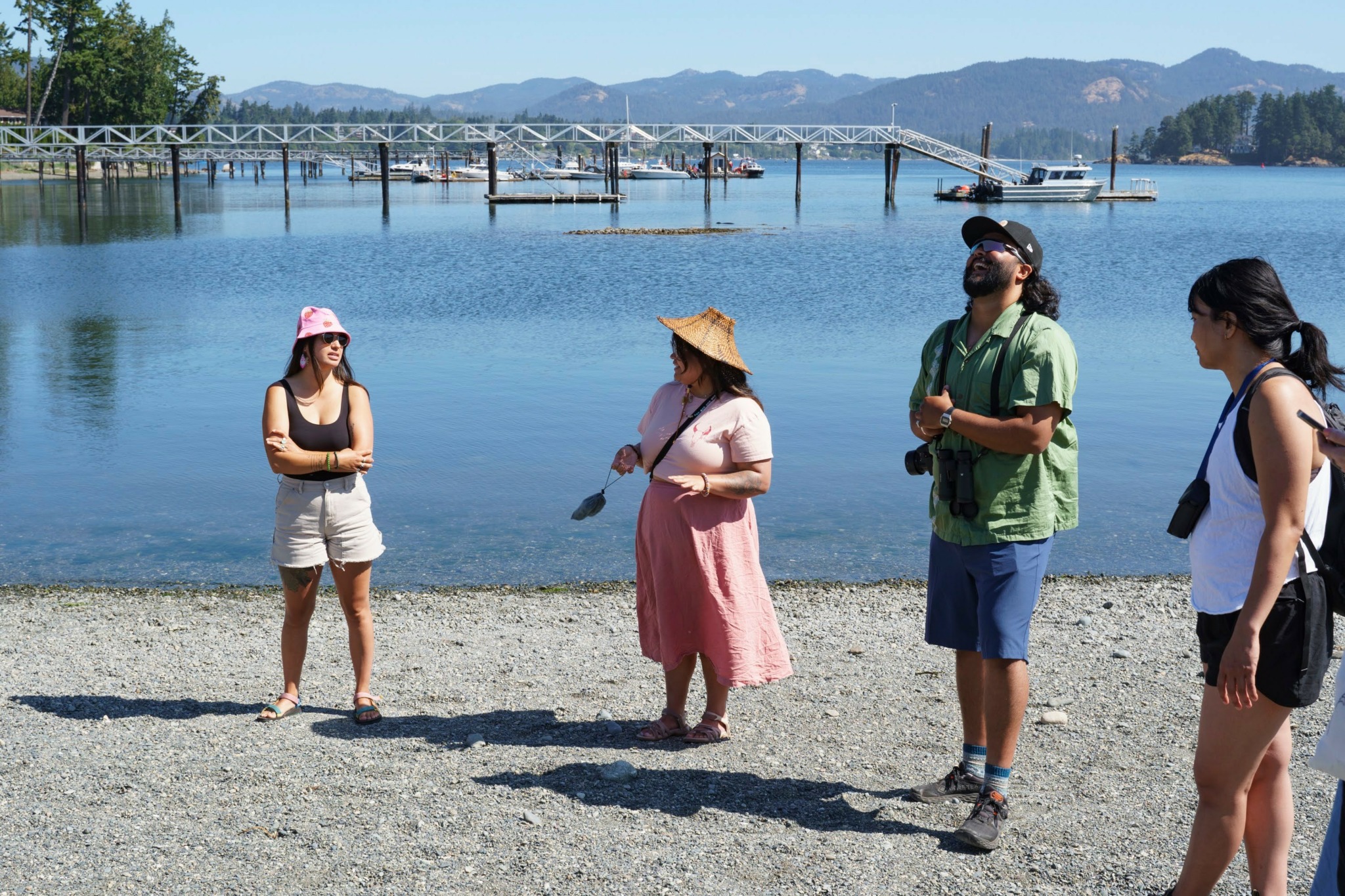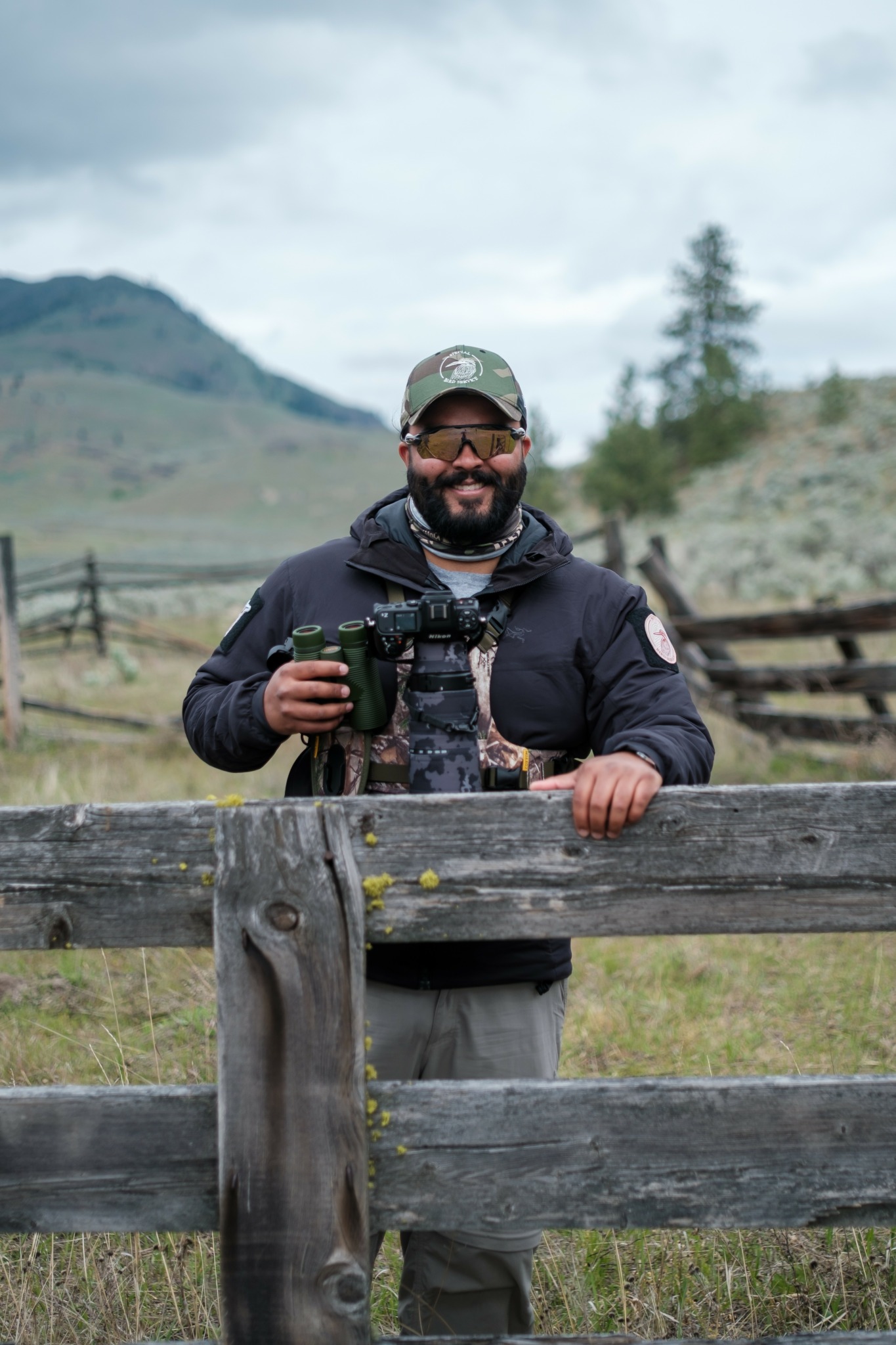Alright – so today we’ve got the honor of introducing you to Trentön Schulz-Franco. We think you’ll enjoy our conversation, we’ve shared it below.
Trentön, thanks for taking the time to share your stories with us today What sort of legacy are you hoping to build. What do you think people will say about you after you are gone, what do you hope to be remembered for?
What sort of legacy are you hoping to build?
I don’t think about legacy in the sense of monuments or personal recognition. The legacy I’m working towards is a steady yet forceful ripple — that the work we do through the Special Bird Service becomes part of a broader cultural shift. That people come to understand that our own health as a people is reflected in the health of our natural world — especially in our communities, especially for people who’ve been excluded from the (his)story of, and relationships with nature. I hope the values we live — ecological stewardship, relationship-building, anti-discrimination, generational knowledge-sharing, and mental health advocacy — become normalized in how communities relate to land and to each other.
We’ve always tried to keep our work rooted in the specific places and peoples we’re in relation with. But I do hope that the framework — this intersection of joy, care, nature, art and justice — travels. That folks take it, adapt it, and build decentralized, locally relevant versions of it in their own communities. That would be the real legacy.
⸻
What do you think people will say about you after you’re gone?
That’s not really for me to decide. But if I had to hope, maybe they’d say: they paid attention. To the air, to the water, to the land, to people, to birds, to patterns. That I listened deeply, acted with care, and tried to shift power — not just hold it.
And that I left behind space. Space for others to grow, to speak, to lead. If the paths I’ve helped open stay open and others walk them — or better yet, build their own — that’s enough for me.
⸻
What do you hope to be remembered for?
For helping people reconnect — with nature, with each other, and with parts of themselves that may have felt unsafe or unwelcome in outdoor spaces. For creating opportunities where healing and stewardship weren’t separate, but intertwined.
I hope to be remembered not as the center of the story, but as someone who helped hold the circle, who believed in other people’s gifts, and helped them believe in them too.
Awesome – so before we get into the rest of our questions, can you briefly introduce yourself to our readers.
My name is Trentön Schulz-Franco, and I come to this work through a mix of law, land, and love for community.
I was trained as a lawyer, with degrees in international environmental law, business management, and legal practice, as well as further studies in counterterrorism, forensic accounting, and private equity. I spent a good chunk of my early career trying to understand the systems that shape our world — how power moves, how decisions get made, and how people and the planet often get left behind in the process. But alongside that legal and policy training, I was always organizing in community — in particular, creating spaces for racialized, queer, and otherwise marginalized people to connect with nature, with each other, and with themselves.
That’s how the Special Bird Service (SBS) was born. It started as a few informal birding walks and outdoor gatherings with friends who didn’t always feel safe or welcome in mainstream environmental or outdoorsy spaces. But it’s grown into something much bigger — a community-led, intergenerational project of stewardship, joy, mental health care, and deep ties to the land, air and water.
Through SBS, we host birding walks, learn about ecology and Indigenous knowledge systems from local communities, run workshops on everything from gardening for birds to artistic workshops, to mental wellness in nature, and work in collaboration with other BIPOC and 2SLGBTQIA+ organizations, Indigenous nations, and local community partners to care for eachother and the places we live. At our core, we’re about building healthier, more resilient communities — through time spent outdoors, through knowledge-sharing, and through community care.
What sets us apart is not just what we do, but how we do it. We take a deeply intersectional approach. We believe that stewardship isn’t just about species counts or habitat mapping — it’s about justice, belonging, and healing. We centre people who are too often left out of stewardship narratives and decision-making, and we work to devolve power rather than concentrate it.
I come from a family that taught me to listen and pay attention — to birds, to language, to the ebbs and flows of life, and to silences. That sensitivity, that mix of discipline and self-expression, has shaped everything I do. Cricket taught me strategy. Birding taught me patience. Law taught me how to read systems. Community taught me how to build new ones.
What I’m most proud of isn’t a single achievement — it’s the ongoing trust we’ve built. We’ve had over 4,000 people, 1,500 in the past year alone, attend our offerings, with many returning again and again. Our model is being adapted in other regions. And we’re mentoring a new generation of leaders who see justice, liberation and health (environmental and human) as deeply interconnected.
To anyone encountering our work for the first time: know that this isn’t a brand or a business in the traditional sense. It’s a movement of change rooted in community care. It’s a reminder that you belong — to a story, to the land, & to community. And it’s an invitation to come outside and begin anew, again.
How’d you build such a strong reputation within your market?
Honestly, I think it’s been the consistency and the care, with which we’ve showed up for our communities — over and over again, without expecting something in return.
The Special Bird Service didn’t start with a business plan or a marketing strategy. It started with a need — for safer, joyful, and healing outdoor spaces for racialized, queer, and marginalized folks. From the beginning, we’ve prioritized relationships over reach, and people notice that. Whether it’s a community bird walk, a workshop on land care centreing collective liberation, or just sharing binoculars with someone who’s never birded before, we take the time to make it meaningful and we share our passion, with genuine curiosity and kindness. That kind of authentic intention builds trust.
My legal and academic background also helped build credible initiatives, especially when advocating for policy change or navigating institutional partnerships. But what really sustains our reputation is how we work — listening, with humility and a willingness to evolve. We’re not trying to be the biggest or most polished; we’re trying to be grounded and (re)generative. That resonates not only with our communities, but with us.
And I think people can feel that this work is personal. It comes from lived experience. From being in rooms where decisions were made about land I love, without the people I love in them. From seeing how joy, community, and nature can be life-saving. That authenticity — paired with compassionate leadership, clear values, and a refusal to compromise on inclusion — is what’s sustains our reputation.
What’s a lesson you had to unlearn and what’s the backstory?
One of the biggest lessons I’ve had to unlearn is the idea of neutrality, and that solutions come only from systems that define themselves as objective — like the law, academia, or policy. My legal education, though incredibly rigorous, often presented itself as if it held the answers, when in fact it was teaching a very narrow worldview. I had to unlearn the belief that if I just “knew enough,” I could fix things from the inside.
Western education tends to gloss over root causes — colonialism, racism, capitalism, dispossession — and instead focuses on symptoms in a way that can make injustice feel natural, inevitable, or too abstract to challenge. It often rewards distance and analysis over relationship and accountability. I was taught how to write compelling legal arguments before I was taught to listen to the land, or to people of that land, whose knowledge has been systematically ignored or erased.
That dissonance became impossible to ignore. I have been in spaces where environmental law was being debated — policies about stewardship, land use, restoration — and realizing that Indigenous voices were altogether absent, and if present often tokenized. That mental health, joy, community, and lived experience were never considered “serious” evidence, even though they were central to the very issues being discussed.
The work I do now with the Special Bird Service is, in many ways, a response to that. It’s about reorienting where and how we find knowledge. About valuing emotion, story, intergenerational wisdom, and relationships as critical infrastructure. It’s about unlearning the idea that the most prestigious institutions are the best sources of truth.
There’s still a place for formal training — it taught me how to see the scaffolding holding power up. But I’ve had to relearn how to trust other forms of knowing. And more importantly, I’ve had to challenge the instinct — drilled in by those systems — to “fix” things without addressing the harm beneath them. Now, I try to start from a place of listening and collective care, rather than control or certainty.
Contact Info:
- Website: https://www.specialbirdservice.com/
- Instagram: https://www.instagram.com/specialbirdservice?igsh=cHV0MW9oemp4dWhu&utm_source=qr
- Facebook: https://www.facebook.com/specialbirdservice/
- Linkedin: https://www.linkedin.com/company/special-bird-service?trk=profile-position
- Youtube: https://youtube.com/@specialbirdservice?si=lLQRj3Y7jbl53cJy


Image Credits
John Wragg, Trentön Schulz-Franco, Claire Marshall & Karissa Chandrakate of Special Bird Service


